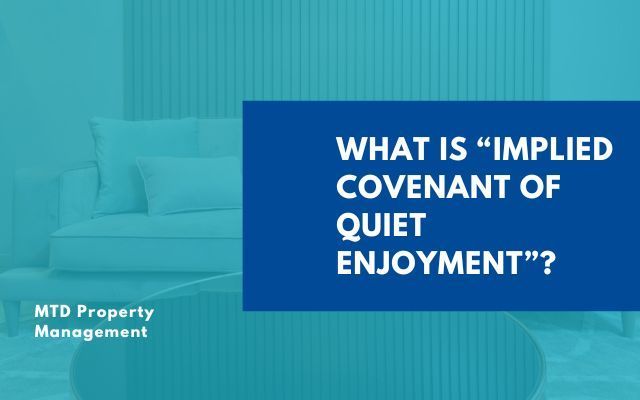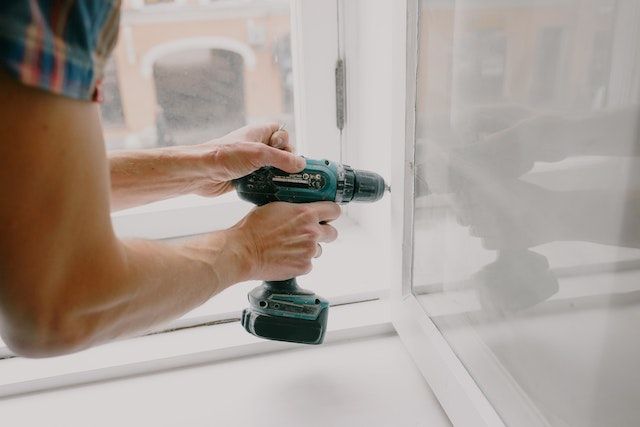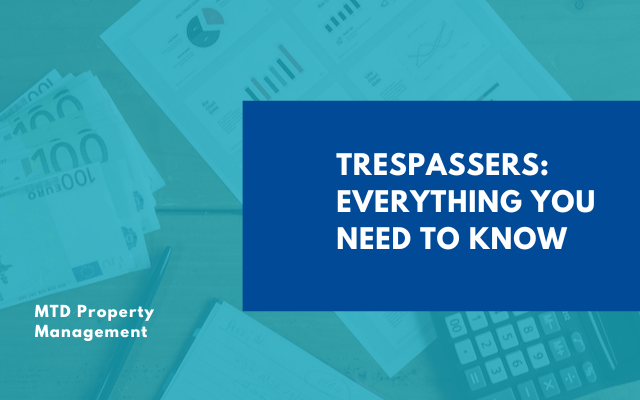What Is “Implied Covenant of Quiet Enjoyment”?

A sound understanding of landlord-tenant laws is crucial for rental property owners. Whether it’s the Fair Housing Act or security deposit laws, complying with local rental laws is crucial for maintaining a good relationship with your tenants. It can also keep you protected from legal liabilities.
This is a legal concept that landlords must know. This constitutes one of your tenants’ most basic rights. Failing to comply can negatively affect the relationship you’ve built with your tenant and can have legal consequences.
To help you avoid this, the experts at MTD Property Management have written this guide. Let’s dive into everything you should know about the covenant of quiet enjoyment!
What Is the “Implied Covenant of Quiet Enjoyment”?
“Covenant” is a legal term that refers to a promise or unspoken agreement to engage in or refrain from a specified action. As such, the quiet enjoyment covenant is included in most residential and commercial lease agreements, even if it’s not explicitly mentioned in a contract.
Despite being implicit and not necessarily written in a lease agreement, landlords cannot request tenants to waive their right to quiet enjoyment of the unit they rent.

The goal of this covenant is to protect tenant’s right to live in a peaceful and quiet environment, without interference or disturbances from the landlord, neighbors, and even other renters. But what exactly does "quiet enjoyment" entail? Well, this concept encompasses several rights, including:
- Freedom from unreasonable disturbances. Tenants have the right to live in peace and quiet. This includes not having to deal with unnecessary disturbances from their landlord, neighbors, or other tenants.
- Right to privacy. Tenants are entitled to full privacy within their rented space. Because of this, landlords cannot enter a rental property without proper notice unless in case of an emergency.
- Right to timely repairs and maintenance. Landlords are legally required to maintain their rental properties in safe, habitable conditions. This includes addressing maintenance issues and repairs promptly so as not to affect their tenant's quality of life.
- Right to a secure environment. Tenants are entitled to safe living conditions. Because of this, landlords are required to provide basic security measures in their rentals, including functional locks, good outdoor lighting, and sturdy doors.
- Freedom from harassment. Tenants have the right not to be harassed by neighbors or other tenants. If they’re victims of harassment, a tenant may have grounds to break their lease early.
Although it’s not the norm, some landlords include an expressed covenant of quiet enjoyment in their lease agreements. This can help build a
better relationship with your tenants, as it proves to them you care about protecting their rights.

Moreover, providing details about your responsibilities and the tenant's rights can significantly reduce potential misunderstandings and even legal disputes.
Common Breaches of the Quiet Enjoyment Covenant
Knocking on a tenant’s door to request due rent and entering the rental property for a scheduled inspection or to deal with an emergency repair don’t constitute violations of a tenant’s right to quiet enjoyment.
Neither does noise from wildlife or normal noise from neighbors and other tenants. While the intervention should be within the landlord's control, the following actions are considered breaches of quiet enjoyment and can have serious consequences.
Unauthorized Entry
In most states, landlords are required to provide at least 24 hours’ notice before entering the property, except in case of an emergency. As a
landlord, you should always strive to follow that rule and obtain your tenant’s consent before entering the property.
Privacy Breaches
Under the covenant of quiet enjoyment, tenants have the right to privacy. As such, landlords should respect that right by protecting their tenants’ information, time, and property.
Failure to Address Noise Complaints
The covenant of quiet enjoyment protects tenants’ rights to live in a peaceful and quiet space. Failing to address
noise complaints and disturbances can negatively affect your tenant’s quality of life. That’s why landlords should always respond to noise complaints promptly and adequately.
Failure to Make Repairs

Failing to make necessary repairs or maintenance in a timely manner can disrupt a tenant's peaceful enjoyment of a rental property. Landlords should always keep their properties in top condition to remain legally compliant and keep their tenant happy.
Self-Help Evictions
Self-help evictions are illegal in most states, as they violate tenants’ rights to live in a safe and peaceful environment. There's usually a clause in the lease agreement outlining your procedures for evictions. In order to remain legally compliant and respect your relationship with your tenants, make sure to communicate with them clearly and double-check local regulations before pursuing an eviction.
Bottom Line
Every landlord should understand what the covenant of quiet enjoyment entails. Understanding this legal concept can significantly improve the relationship with your tenant and help you keep your investment protected.
Want to learn more about the covenant of quiet enjoyment in Chicago? Contact
MTD Property Management today! We can help you keep your investment protected and your tenant happy.
Blog









